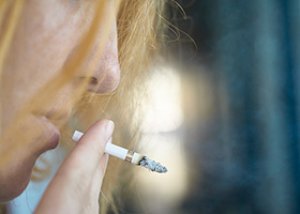
All iLive content is medically reviewed or fact checked to ensure as much factual accuracy as possible.
We have strict sourcing guidelines and only link to reputable media sites, academic research institutions and, whenever possible, medically peer reviewed studies. Note that the numbers in parentheses ([1], [2], etc.) are clickable links to these studies.
If you feel that any of our content is inaccurate, out-of-date, or otherwise questionable, please select it and press Ctrl + Enter.
Babies of moms who smoke may hear worse
Last reviewed: 02.07.2025
 ">
">If a mother-to-be smokes during pregnancy and lactation, her baby may have hearing problems in the future. This information was shared by the head of one of the Japanese research groups, Professor Koji Kawakami, representing Kyoto University.
Everyone knows about the adverse effects of smoking: this fact is obvious and does not require further proof. However, the most negative is the intrauterine effect of nicotine on the future child. Both smoking and alcohol consumption by the expectant mother are factors in the development of serious health problems in the baby. A woman's bad habits can turn into various long-term consequences, and they can manifest themselves at different times. Sometimes such complications affect one or more organ systems, sometimes - visual or auditory function. But, despite extensive preventive work in this direction, many expectant mothers are still in no hurry to give up cigarette addiction.
The new study by scientists involved monitoring the health and development of babies starting at age three. All the children were born between 2004 and 2010. Almost 4% of these children had mothers who smoked while pregnant. More than 15% of the women quit the habit after learning about their pregnancy, but their babies were still exposed to nicotine in the womb. About 4% of the children were exposed to nicotine in the form of passive smoking during the 4 months after birth. The mothers of almost 1% of the children did not quit smoking either during pregnancy or after the birth of their babies.
Subsequent processing of the information showed that the frequency of hearing impairments in children under 3 years of age was more than 4.5%.
Inhaling cigarette smoke during pregnancy increased the risk of developing hearing impairment in children by almost 70%. If a mother smokes both during pregnancy and after the baby is born, the risk of such pathologies increases almost 2.5 times.
According to Professor Kawakami, the results of the study indicate that preventive measures and the level of education among the population should be improved and optimized. If a woman plans to become a mother in the near future, she should take care of the health of the future baby in advance. And it is worth thinking about this several years before conception, because it can take more than one year to remove tar and nicotine from the body.
Is it worth risking your own health and the health of your future baby? And all this for the sake of a banal and useless habit? Scientists are asking doctors and specialists from other fields to help protect the health of future generations.
The results of the study were published in the journal Wiley (http://newsroom.wiley.com/press-release/paediatric-and-perinatal-epidemiology/exposure-smoking-and-after-birth-linked-hearing-).

 [
[